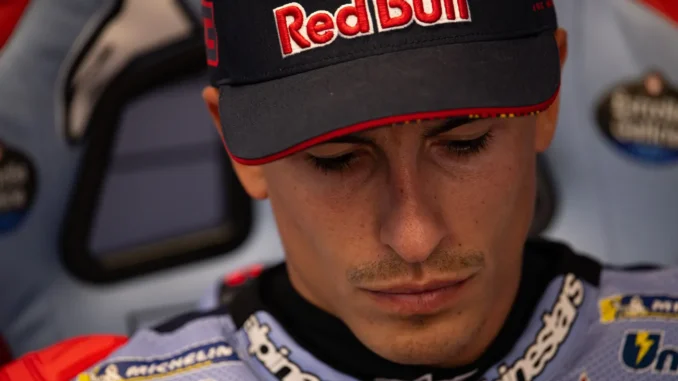

Marc Marquez, the six-time MotoGP world champion, is widely regarded as one of the most talented riders in the history of motorcycle racing. Known for his aggressive style, fearless overtakes, and ability to push the limits of his machine, Marquez has dominated the sport like few others. However, in recent years, his quest for additional world titles has hit significant roadblocks. As of now, Marquez is struggling to re-establish himself as a legitimate contender for the MotoGP championship. So, what exactly is preventing him from reclaiming his throne?
1. The Lingering Effects of Injuries
One of the most significant factors hindering Marquez’s title aspirations is the series of injuries he has sustained in recent years. The 2020 season marked a turning point when he suffered a severe fracture to his right arm at the Spanish Grand Prix. Multiple surgeries and a prolonged recovery kept him out of action for nearly the entire season. Although he made a comeback in 2021, it was clear that he was not at his physical best.
Compounding the problem, Marquez has also dealt with recurring diplopia (double vision) issues caused by nerve damage sustained during a crash in 2011, which resurfaced after another crash in 2021. These injuries have not only affected his physical capabilities but also raised questions about his long-term durability in a sport as demanding as MotoGP. For a rider who relies heavily on precision and fearlessness, even minor physical limitations can make a significant difference.
2. The Competitive Landscape Has Shifted
MotoGP has undergone a transformation in the years Marquez has battled injuries. The rise of younger talents like Fabio Quartararo, Francesco Bagnaia, and Jorge Martín has added new dimensions to the championship battle. Quartararo, in particular, has emerged as a formidable competitor, winning the 2021 world championship with consistent performances and a measured approach. Bagnaia’s triumph in 2022 further underscored the shift in the competitive hierarchy.
Additionally, advancements in bike technology and performance from manufacturers like Ducati, Yamaha, and Aprilia have raised the overall level of competition. Ducati’s Desmosedici GP, in particular, has become the benchmark for speed and stability, making it challenging for Honda and other manufacturers to keep up. Marquez is no longer competing against a field he could dominate at will; instead, he faces rivals equipped with machinery that is arguably superior to his own.
3. Honda’s Struggles with Development
Marquez’s fortunes have been closely tied to the performance of his Repsol Honda bike. While he has often compensated for the shortcomings of his machinery with his extraordinary talent, the current state of Honda’s MotoGP program has made this task increasingly difficult. The RC213V has struggled with rear grip, cornering stability, and overall competitiveness, leaving Marquez unable to extract the maximum from the bike.
The development issues at Honda are not solely technical but also strategic. The team’s reliance on Marquez as their lead rider has arguably hampered their ability to adapt to the evolving demands of the championship. With other manufacturers investing heavily in data-driven development and innovative aerodynamics, Honda appears to be playing catch-up. This lag in competitiveness has left Marquez fighting an uphill battle against better-equipped rivals.
4. The Mental and Emotional Toll
In addition to physical challenges, Marquez faces significant mental and emotional hurdles. Years of relentless competition and the pressure to perform at the highest level take their toll on any athlete, but the added weight of injury recoveries and uncompetitive machinery can be particularly demoralizing. Marquez’s crashes and injuries have also introduced an element of caution into his riding style, something previously absent from his approach.
While Marquez remains one of the most mentally resilient riders on the grid, even he is not immune to the psychological strain of consecutive setbacks. Questions about whether he can return to his dominant form—and whether his body can withstand the rigors of another championship campaign—undoubtedly loom large in his mind.
5. Adaptation to Evolving Riding Styles
MotoGP’s evolution has also introduced subtle but significant changes in riding styles and race strategies. Modern riders are increasingly relying on precision, tire management, and aerodynamic efficiency rather than pure aggression. Marquez’s hallmark style—late braking, aggressive overtakes, and corner exits on the edge—is not as effective in the current landscape.
To remain competitive, Marquez must adapt his approach to align with these changes. While his innate talent gives him the tools to evolve, the transition is not straightforward. Competing against riders who have honed their skills in this new era requires time and effort, both of which are in short supply for Marquez as he contends with other challenges.
Conclusion
Marc Marquez’s journey back to being a legitimate title contender is fraught with obstacles. Injuries, a fiercely competitive field, Honda’s developmental struggles, mental fatigue, and the need to adapt to evolving racing dynamics all contribute to his current predicament. Yet, if there’s one rider capable of overcoming such adversity, it is Marquez. His career has been defined by moments of brilliance and resilience, and fans around the world continue to hope for another chapter of greatness. However, until he can find a way to surmount these challenges, the dream of adding another MotoGP title to his illustrious career remains elusive.

Leave a Reply